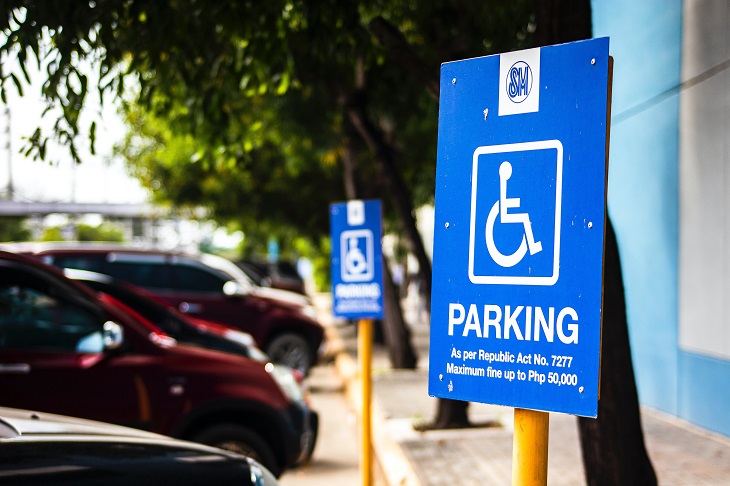Handicap parking permits offer individuals with disabilities and reduced mobility with much-needed accessibility and convenience in navigating public spaces. These permits signify more than just a convenient parking spot; they represent the culmination of efforts to ensure equitable access for all members of a community. However, the misuse of these permits is an issue as it undermines the rights of those who genuinely depend on them for daily mobility. Beyond the unethical practice, the improper use of handicapped parking permits carries significant legal consequences that can profoundly impact offenders.
In this comprehensive guide, we touch base on the multifaceted implications of misusing handicapped parking permits, including the legal consequences, exploring the intricacies of state and federal regulations governing these permits, and the ethical considerations surrounding their misuse.
Legal Repercussions of Misusing Handicap Parking Permits
To understand the severity of misusing handicapped parking permits, we need to understand and grasp the legal definitions and regulations surrounding these permits. Misuse can encompass various actions, including unauthorized use, forgery, or alteration of permits.
Let’s consider a scenario in which an individual without a disability uses a family member’s handicapped parking permit to gain preferential parking access. This act constitutes unauthorized use, a clear violation of handicap parking regulations. Similarly, forging or altering a handicapped parking permit to extend its validity or to replicate one illegally falls within the realm of misuse. Each state has its own laws governing handicap parking permits, with penalties varying depending on the nature of the offense.
The consequences of these actions can vary significantly depending on the state in which they occur. For instance, in California, unauthorized use of a handicapped parking placard can result in fines ranging from $250 to $1,000, along with potential community service requirements. In contrast, in New York, offenders may face fines of up to $250 for a first offense, escalating to $500 for subsequent violations.

Federal regulations, such as the Americans with Disabilities Act (ADA) also play a significant role in safeguarding the rights of individuals with disabilities. Let’s consider a case where a business owner fails to maintain accessible parking spaces in compliance with ADA guidelines, thereby impeding individuals with disabilities from accessing their premises. Such violations not only contravene federal law but also subject the business owner to legal action and civil penalties, including fines and mandatory accessibility modifications.
The legal framework surrounding handicapped parking permits is complex and multifaceted, encompassing both state-specific regulations and federal mandates under the ADA. Failure to adhere to these regulations not only undermines the rights of individuals with disabilities but also exposes offenders to significant legal liabilities and penalties.
Consequences for Improper Use of Handicap Parking Permits
The consequences of improperly using handicapped parking permits extend beyond legal fines and penalties. Consider the scenario of a person with a severe mobility impairment who relies on a handicapped parking permit to access medical facilities for critical treatments. Now, envision a scenario where this individual arrives at the hospital only to find all designated handicapped parking spaces occupied by vehicles without valid permits, effectively denying them access to essential healthcare services. In this instance, the consequences of misuse transcend mere inconvenience; they directly impede an individual’s fundamental right to healthcare access, potentially jeopardizing their health and well-being.
There are also ethical considerations to ponder. Imagine the emotional toll on a person with a disability who witnesses able-bodied individuals brazenly utilizing handicapped parking spaces without legitimate need. Such actions not only violate the law but also betray a fundamental lack of respect and empathy for individuals with disabilities. It sends a distressing message that the needs and rights of those with disabilities are disregarded, creating a culture of discrimination and marginalization.
The trust placed in the handicapped parking system is eroded when permits are misused. Consider the impact on individuals who legitimately require handicapped parking accommodations but are met with skepticism or hostility due to rampant misuse of permits.
Punishments for Abusing Handicap Parking Permits
Authorities across jurisdictions take the misuse of handicapped parking permits with seriousness, recognizing the profound impact it has on individuals with disabilities and their communities. Let’s consider the case of a city where law enforcement officers conduct regular patrols of parking lots and public spaces to enforce handicap parking regulations. Upon discovering a vehicle parked in a handicapped spot without a valid permit, the offender is issued a citation and fined accordingly. In this scenario, the imposition of fines serves as a deterrent, dissuading individuals from engaging in unauthorized use of handicapped parking spaces.
However, fines alone may not suffice to address the root causes of permit misuse. Authorities may implement alternative measures such as community service or educational programs on disability awareness. Imagine a scenario where offenders are required to volunteer at local disability advocacy organizations, gaining firsthand insight into the challenges faced by individuals with disabilities. Through these experiences, offenders develop a deeper understanding of the importance of handicapped parking permits and the impact of their actions on others.

Repeat offenders or those who practice the misuse of handicapped parking permits may face more severe consequences. Consider the case of an individual who repeatedly uses a forged permit to gain unauthorized access to handicapped parking spaces. In such instances, authorities may opt to suspend or revoke the offender’s handicapped parking permit, effectively depriving them of the privilege they have abused. In extreme cases involving flagrant disregard for the law, criminal charges may be brought against offenders, leading to legal proceedings and potential incarceration.
There’s no doubt that authorities employ a multifaceted approach to address the misuse of handicapped parking permits, combining fines, community service, educational programs, and legal sanctions to deter offenders and uphold the integrity of the accessibility system. The purpose is to send a clear message that such actions will not be tolerated, thereby safeguarding the rights of individuals with disabilities.
Who Enforces Penalties?
Law enforcement agencies and parking enforcement authorities are responsible for enforcing handicap parking regulations and addressing instances of misuse. Offenders may be issued citations or summonses requiring them to appear in court to answer for their actions.
In judicial proceedings, offenders may face legal penalties such as fines, court fees, and restitution payments. These financial burdens can add up, making the consequences of misuse financially significant for the offender.
Convictions for handicapped parking permit misuse can have long-term consequences on the offender’s driving record. In some cases, offenders may face license suspension or revocation, affecting their ability to drive legally in the future.
Ramifications of Unauthorized Use of Handicap Parking Permits
Beyond the legal and financial consequences, unauthorized use of handicapped parking permits can have far-reaching ramifications for the offender. Public perception of individuals who misuse these permits is often negative, leading to public shaming and social stigma.
The personal reputation and credibility of the offender may suffer as a result of their actions. Employers, colleagues, and community members may view them unfavorably, impacting their relationships and opportunities in various spheres of life.
Ultimately, the misuse of handicapped parking permits reflects a broader societal issue regarding attitudes toward individuals with disabilities. Education and awareness can help to address this issue and foster a more inclusive and respectful community.
How To Make Sure You’re Not Wrongly Penalized For Parking In A Disabled Space
Mistakes do happen on occasion, so ensuring that you’re not wrongly penalized for parking in a disabled space is essential for maintaining respect for individuals with disabilities and avoiding legal consequences. Even if individuals don’t personally require handicapped parking, they need to be aware of how to recognize a disabled parking bay and understand the rules associated with it. Here’s how you can ensure you’re parking legally and ethically:
- Know the Signs: Disabled parking bays are typically marked with specific signs and symbols. Look for the universal wheelchair symbol painted on the ground or displayed on a nearby sign. These symbols indicate that the space is reserved for individuals with disabilities.
- Observe the Markings: In addition to signage, disabled parking bays often have specific pavement markings, such as blue paint or lines, to distinguish them from regular parking spaces. Pay attention to these markings to identify designated handicapped parking areas.
- Read the Signs: Take the time to read any signs posted near the parking space. These signs may provide additional information about who is eligible to park in the area, the hours of enforcement, and any specific rules or restrictions.
- Check for Permit Requirements: In many jurisdictions, parking in a disabled space without a valid handicap parking permit is illegal and subject to fines or penalties. Before parking in a disabled bay, ensure that you meet the eligibility requirements or have the necessary permit displayed in your vehicle.
- Avoid Misuse: Even if you’re in a hurry or struggling to find parking, resist the temptation to park in a disabled space if you don’t have a valid permit. Misusing handicapped parking spaces not only violates the law but also deprives individuals with disabilities of essential access to facilities and services.
- Respect Access Needs: Remember that disabled parking bays are reserved for individuals with disabilities who require closer proximity to entrances for accessibility reasons. By parking elsewhere and leaving these spaces available, you help ensure that individuals with disabilities can access the resources they need without obstacles.
- Report Misuse: If you encounter a situation where someone is misusing a handicapped parking space, consider reporting it to the appropriate authorities. Many jurisdictions have mechanisms in place for reporting parking violations, and your action could help prevent further misuse and uphold the integrity of the handicapped parking system.
By familiarizing yourself with the signs, rules, and regulations associated with disabled parking bays, you can avoid inadvertently parking illegally and contribute to creating a more inclusive and accessible environment for individuals with disabilities in our communities.
Misuse of Handicap Parking Permits
Handicap parking permits represent more than mere convenience; they symbolize the ongoing efforts to ensure equitable access for individuals with disabilities in our communities. However, the misuse of these permits poses a significant threat to the rights and dignity of those who genuinely depend on them for daily mobility. Throughout this guide, we have explored the multifaceted implications of misusing handicapped parking permits, from the legal repercussions to the ethical considerations and societal ramifications.
The legal regulations and consequences for misuse surrounding handicap parking permits are complex, with state-specific regulations and federal mandates under the Americans with Disabilities Act (ADA) governing their use. Violating these regulations can result in fines, penalties, and even criminal charges, underscoring the seriousness with which authorities approach permit misuse. Additionally, repeat offenders may face more severe consequences, including suspension or revocation of their permits, further emphasizing the importance of adhering to regulations.
The consequences of misusing handicapped parking permits extend to individuals with disabilities who rely on these permits for access to essential services and facilities. Unauthorized use not only denies them access but also perpetuates discrimination and marginalization within society. The distrust in the handicapped parking system undermines efforts to foster inclusivity and respect for individuals with disabilities.
If you see someone parked illegally in a disabled parking spot and you don’t know what to do, you can find more information in our blog post to learn more.
Need more information on disabled parking in the US? From handicapped parking at Yellowstone National Park in Wyoming to handicapped parking for out-of-state visitors in Vermont, we offer a useful bank of detailed topics on the Dr Handicap blog. Check it out today!
Featured image by Wesley Tingey on Unsplash.
